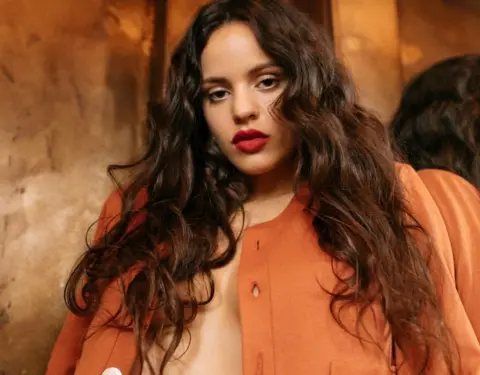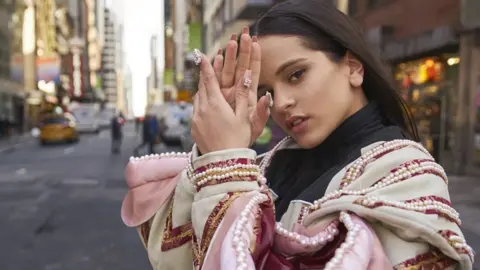Flamenco star Rosalía kicks off BBC Sound of 2019 countdown
Flamenco music has never troubled the UK charts - but that looks set to change with the arrival of Rosalía.
The 25-year-old is turning flamenco on its head by tethering its vocal melismas and palmas (hand clapping) to the sounds and attitude of hip-hop.
It's earned the singer fifth place in the BBC Music Sound of 2019, which tips acts for success in the next 12 months.
Born Rosalía Vila Tobella in Sant Esteve Sesrovires, Spain, she's already a big star at home.
Her 2017 debut Los Ángeles spent 67 weeks in the Spanish album chart.
Its fusion of old and new world traditions "revolutionised flamenco", according to Spain's La Vanguardia, while the striking video for De Plata, in which Rosalía performs intricate flamenco moves against a series of Instagram-friendly backdrops, racked up four million view on YouTube.
She soon caught the eye of Pharrell Williams, who invited her to record with him in LA, and Oscar-winning writer-director Pedro Almodóvar, who cast her alongside Penélope Cruz in his next film, Dolor y Gloria.
Allow Google YouTube content?
But it was her second album, El Mal Querer, that brought the singer to a global audience.
A modern retelling of the 13th Century novel Flamenca, it started life as Rosalía's graduate thesis for Barcelona's Catalonia School of Music, where she studied flamenco (they accept one student per year) and music production.
The album earned her five nominations at the Latin Grammys, where the ominous, bass-busting single Malamente won best alternative song and best urban track.
With Latin pop continuing to rise, and a major label fighting her corner, 2019 could be a breakthrough year for the Catalan star.

Hi Rosalía! Congratulations on making it into the Sound of 2019!
Thank you so much! I'm really happy. I've discovered a lot of music by listening to the BBC - but it was a big surprise that I could have a space on this list, you know?
How did you first get interested in music?
I always had a connection with music. Nobody in my family played music professionally but, as a little kid, I used to sing and dance all the time. Whatever I heard on the television or the radio, I'd just repeat it. I don't know why.
Where was home?
I grew up in Sant Esteve Sesrovires, a small village near Barcelona. My house was near the countryside, so there was a lot of nature, and at the same time my village is surrounded by factories. That conditioned me a little bit.
 Sony Music
Sony MusicI can hear that in your music - there are a lot of acoustic sounds but you also sample a revving motorcycle on De Aquí No Sales.
Exactly. I always liked motorcycles and cars when I was a kid. There's never a sound that I think I can't use in my music.
Did you always approach songwriting like that?
I got obsessed with flamenco when I was 13 and flamenco is my foundation, but I'm always trying to understand la musica tonal - other cultures, other music. I grew up with Tupac Shakur, but I also loved Wagner and Chopin.
So although I had a very acoustic sound when I first started singing flamenco, later I wanted to experiment with samples and beats, because I'm very connected with urban music.
Was it easy to combine the two?
It was very natural. I had it in my ear and in my mind - all those different sounds that are usually sin presentia [not in sympathy]. Like, in flamenco, nobody has ever felt those sounds could live in the same place at the same time. It's difficult to explain in English but I'm doing my best!
 Sony Music
Sony MusicThe album title translates in English as Toxic Love. What inspired the story?
I had the title before anything else, during the last year of my university degree. I wanted to explore this bad love - las pasiones. You know, like domination, the dark side of love.
And I wanted to make a record where every song could be a chapter, almost so you could "read" the album. Like, when you hear the third song, maybe you hear it in a different way because you know what happened in chapter two. So I just started looking for references, digging through books to find traditional lyrics.
How did you discover Flamenca?
I found it completely at random. I was drinking coffee with a friend of mine, and he said, "Have you read this book?" and it blew my mind because the story was about a woman who falls in love with a man who proposes marriage - but then he gets super crazy jealous and imprisons her. I connected with that story so much that I felt I could compose the structure, the chapters, around this idea. It was perfect.
Was it a challenge to channel all that angst and vulnerability and aggression?
For me, it was interesting to write in a masculine voice or think in a feminine voice, just in particular for this story. I tried to find different ways to use my voice, I worked with a choir of young girls, and I worked these very aggressive flamenco singers. I wanted to find different ways to approach this flamenco inspiration and electronic sound but with voices always in the centre.
Allow Google YouTube content?
The melodies often have an Arabic feel. Is that common in flamenco?
Flamenco is connected with so many types of music. It has Jewish culture inside, Arabian culture inside, Russian culture inside, Spanish culture inside. It's linked to African music too, because African music has the "amalgama" rhythms you can find in flamenco. You can find everything in flamenco. That's why it's so beautiful.
Flamenco is very closely associated with dance, too. Are your performances as physically strenuous as they look?
I think so. For me, there's a connection: The more free my body is, the better my voice sounds.
I used to sing in Tablaos, these traditional places where they played this music and I used to watch how the dancers moved. I have always been attentive to all the detail. I also studied guitar - I'm not a flamenco guitar player because that's so difficult, but I've been studying for a long time just to understand the chords and the harmony.
Allow Google YouTube content?
Your videos both celebrate and deconstruct the cultural and religious symbols of Catalonia. Can we talk about that?
My parents are not religious, but my grandma was. She brought me to church some Sundays and I remember the music and the heaviness of the morality. When I use that imagery, I'm not trying to make an apology or criticism. It's about putting something on the table that's related to my experiences and my culture, and using visual metaphors so you can understand even harder or better my music.
There's a moment in Pienso En Tu Mira where you're performing in between two moving trucks. Every time I see it, I worry you're about to get run over.
I was worried about the same thing when we shot it! I just had to trust all of the crew and I survived it! But I love taking risks everywhere, from my music to my videos.

Follow us on Facebook, on Twitter @BBCNewsEnts, or on Instagram at bbcnewsents. If you have a story suggestion email [email protected].

